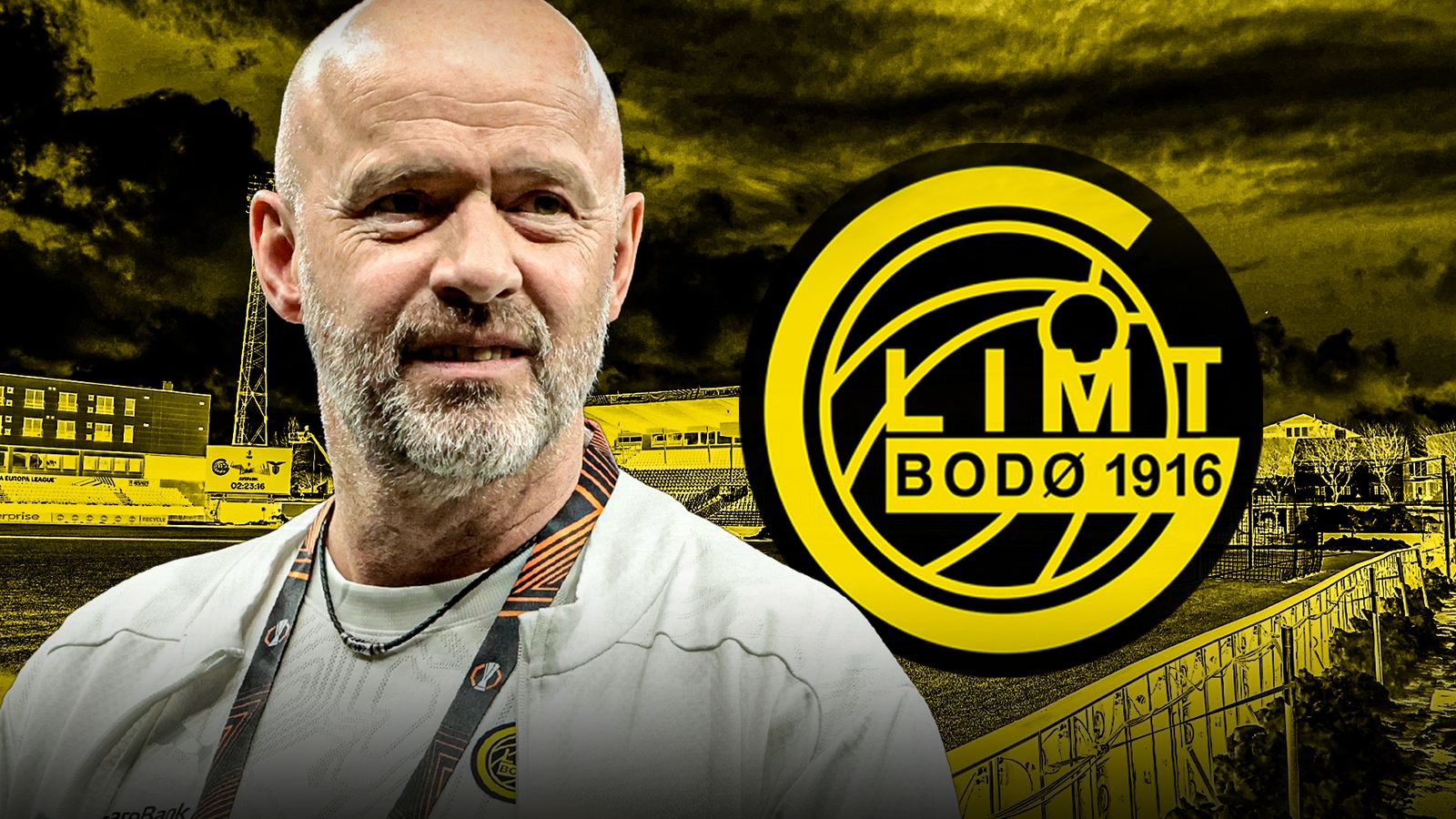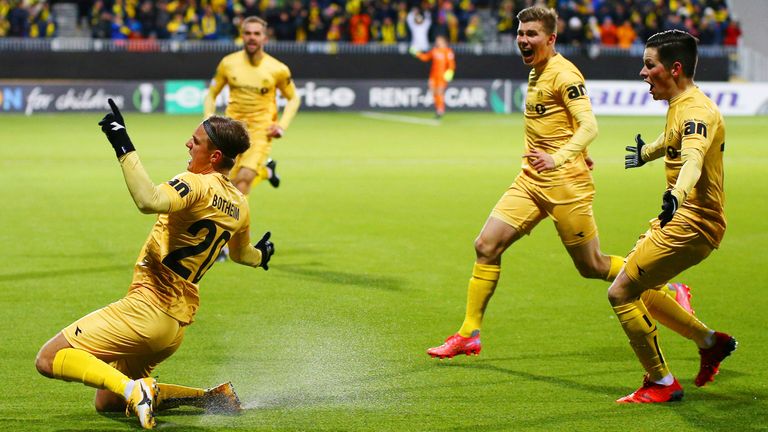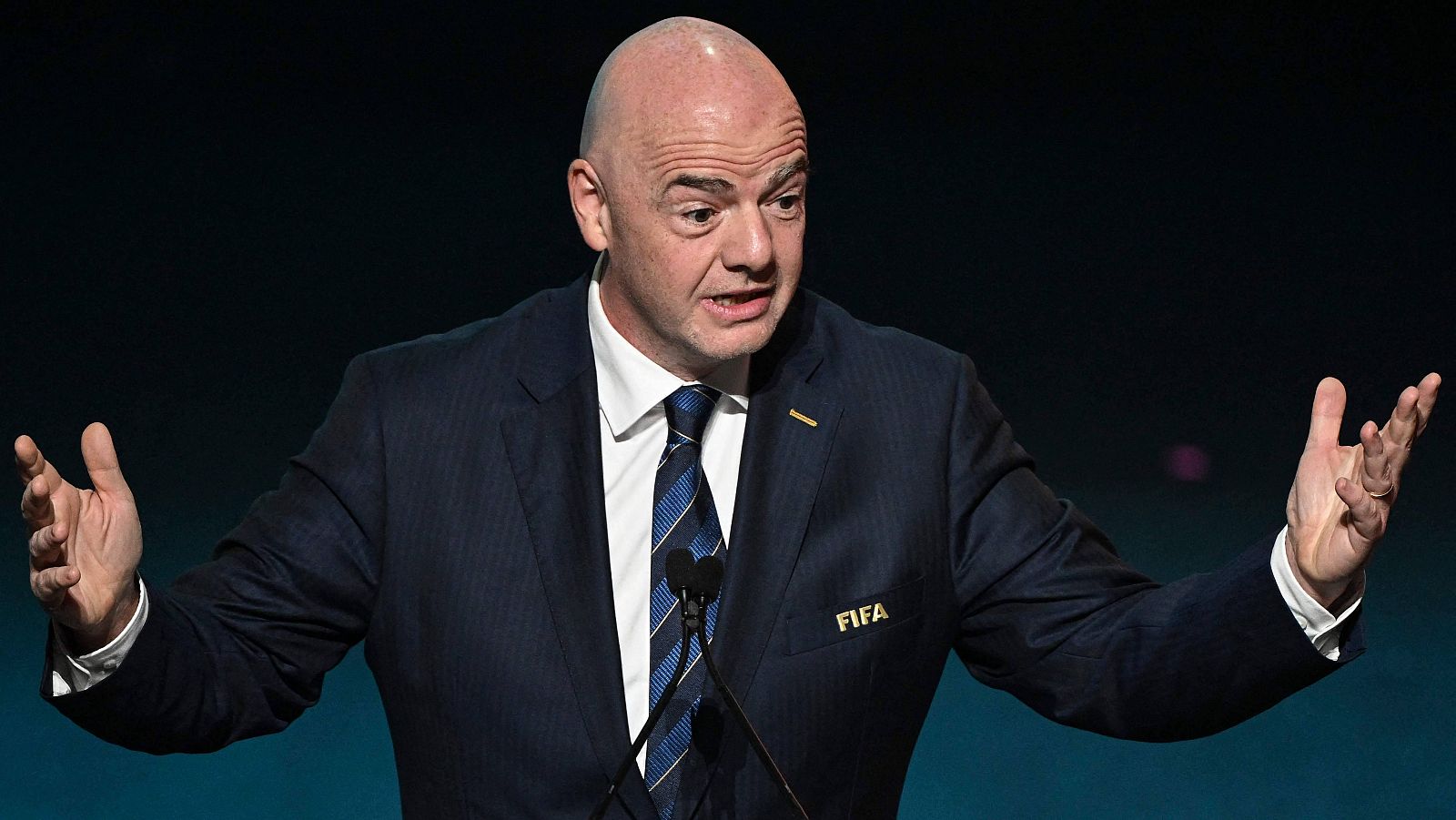
Norway will host its first Champions League proper game in 18 years on Tuesday, but it will not be at the home of established giants Rosenborg, Molde or Valarenga.
Instead, it is a team from a city of less than 50,000 people in the Arctic Circle.
Bodo/Glimt are rising up the European ranks having dominated domestic football. League champions for four out of the last five seasons, they made their Europa League debut in 2022, then reached the semi-finals of the competition last term, losing to Tottenham Hotspur.
Now, they are preparing to face Spurs again as Bodo welcome the best Champions League teams to their 8,720-seater stadium for the first time.
But if you ask anyone at the club, their success cannot be tied to a world-class manager, nor a set of star players or tactics. Rather, a deep-rooted culture and team spirit.
And behind that, is their mental coach Bjorn Mannsverk – who was an active fighter pilot for more than 20 years and has been presented in Norway as the individual who created psychological miracles in the team dressing room.
Mannsverk’s role is unique in the game: he has no interest in football and even spends 75 per cent of his time working for the Norwegian Oil Fund. And yet he has become a key pillar at the club.
That is mainly through his one-on-one mental training sessions with the players, as well as his group meetings. These sessions are not compulsory, yet every player chooses to work with him.
To help chart his success at the club, Mannsverk joined Bodo/Glimt in the summer of 2017 – their centenary year. But their celebrations were ruined by relegation from the Norwegian top flight. It was a rock-bottom moment – and a far cry from where they are now.
“They said it was down to a total mental collapse,” Mannsverk tells Sky Sports about that relegation which preceded his arrival at the club, a move led by sporting director Havard Sakariassen.
“Even though they had the football skills in the team to remain in the top division, they didn’t manage it. They didn’t handle the pressure – and they recognised they didn’t have anything when it comes to the psychological or mental side of things.”
Mannsverk discovered how helpful a good psychology could be in his own career as a fighter pilot – especially when it comes to training. Norwegian fighter pilots rarely experience proper combat, so spend a lot of time in practice situations.
The mental training was trialled by his squadron between 2009 and 2010, and a year later, they did indeed undergo missions in Libya – working alongside UK forces – as well as in Afghanistan. It was there where Mannsverk saw the real effects of the mental training.
“We let go of some of the pressure on the individual level, it built more resilience,” he recalls. “And as a group become more efficient.
“The way we trained was excellent – it already made missions easy. But the mental training gave us something extra that we hadn’t had before.
“It was about being more aware of when emotions and feelings tried to distract you. Like when you start dropping bombs – you’ve never done that before – and then you see them explode, an inferno of fire and fragments everywhere. You start thinking, you get feelings.
“The effect of the training was to increase my capability to focus, which was already good, but this was even better. It made me visualise: what should I be thinking about? What is my motivation? Is this actually dangerous? Could I be shot down? A lot of dilemmas I could prepare myself for.”
Mannsverk became a part of the mental training teaching programme after seeing those benefits – and then Bodo/Glimt called on his services in their hour of need.
In his first meeting with the coaching staff, Mannsverk explained his philosophy and after it ended, he got a tap on the shoulder. It was Kjetil Knutsen, the assistant manager at the time, who told him he fully believed in his methods.
Knutsen was promoted to head coach a year later and he, with Mannsverk a key part of the furniture, has overseen the best sporting success in the history of the club over the last seven years.
How Mannsverk turned Bodo’s players around
Bodo’s mental coach does not believe in “one-man shows” or miracles. For Mannsverk, it is about working hard over time, being conscious of doing the right things, and stopping doing the wrong ones. There is no quick fix.
Upon arriving at the club, Mannsverk started looking at the individuals of the team. The coaching staff presented a few players who needed psychological support after their relegation. One of them was Ulrik Saltnes.
The midfielder was a young player with a huge future ahead of him – except no one saw it on the pitch. He was great in training, but he “sucked” in matches, according to Mannsverk, partly due to stomach problems dating back to his early teenage years which normally forced him off at half-time. There was no medical reasoning for it.
Saltnes attended a Mannsverk session with a desire to quit football. “He told me: ‘I’m so tired of failing. I’m so tired of having a lot of pain. So I already made my decision: I’m going to play for a few more months, and then start my education in August, September. The club is informed, I’m out’.”
Six weeks later, Saltnes’ pain was gone after sessions with Mannsverk. He scored 15 goals in 30 games in the Norwegian second tier that same year. He is still a key pillar of Bodo’s team, having made over 400 appearances for the club and scoring double-digit goal tallies in four out of the last six seasons.
“I actually used this information of ‘I’m going to quit’,” says Mannsverk about his conversations with Saltnes, before detailing what he said.
“You have a few months left, why don’t you just go with the flow?
“You can’t really get fired, because you already told them that you’re going to quit. And is it even possible to play less than you already do?”
“He agreed on that kind of rational way of thinking,” Manssverk recalls. “And then he managed to do that. He just let go of the pressure, went to the flow.”
There are many other individual success stories about Mannsverk in Bodo/Glimt – club captain Patrick Berg is another player taken from a rock-bottom place and is now a key player for the Norwegian side.
Sharing mistakes and ‘The Ring’ – lessons from a fighter pilot
Getting individuals performing is one thing – how do you then make a team? Mannsverk arrived at Bodo/Glimt with the team completely unable to communicate with each other in team meetings.
“It was total quiet. Total quiet,” he recalls. “And I said: ‘Why don’t you talk?’ They said: ‘No, we’re not used to this’.
“What would their communication with the coaching staff be? It wasn’t a dialogue, it was a monologue. Not because they wanted a monologue but because they were not trained to have a dialogue.
“And I asked them: ‘Why don’t you start giving each other feedback?’ And it was absolutely no. So we had to kind of reset.”
One of the practises invented in Mannsverk’s group sessions was ‘The Ring’. After every goal Bodo concede, the players gather in a huddle to not just discuss their mistakes – but share them.
The arena for that concept was inspired by Mannsverk’s fighter pilot experiences. “When it comes to flight safety, it was really important that we immediately stood up and were honest about our mistakes,” he recalls.
“It was not to blame each individual but we understood that we need to learn from it. You can make a mistake and survive, but the next one you could do the same one and you could kill yourself.
“It was really important to share the mistakes, so you weren’t afraid of them. That was a must.
“As fighter pilots, we were really good on giving feedback. It was very honest feedback. We didn’t waste time, it was straight forward and with precision. It was not just feedback on me as a pilot, but also me as a person and my behaviour.”
And to mark how far Bodo have come in this team-sharing regard, one of Mannsverk’s highlights at Bodo/Glimt is when former midfielder Hugo Vetlesen started sharing notes with the midfielders competing for his position in the team.
‘We needed that loss to Spurs’
Another highlight was the 6-1 thrashing of Jose Mourinho’s Roma in the 2021 Europa Conference League. “Not because of the result,” says Mannsverk. “It was the first time I really saw so many players playing at their potential. Some of them had made giant leaps – and they really played as a team.”
There have been disappointments at Bodo too, with the Norwegian side losing to Spurs in last season’s Europa League semi-finals, failing to overturn a two-goal first-leg lead despite dominating the tie in Norway.
“That was not a setback. That was an inspiration,” claims Mannsverk. “What I saw in Bodo, that was a good reference of people putting those skills and playing as a team. Wow, that was great.
“We have our values which is loyalty to how we play and behave, the brothers-in-arms feeling where we stand together in ups and downs.
“We needed that loss. A lot of the players and coaches refer to that going: ‘we need to sharpen up, we have something to aim for’.”
Spurs should have some concern. Bodo/Glimt have caught the eye this season.
In the play-off round, they thumped Sturm Graz 5-0 in the first leg to all but secure a league-phase spot – another highlight for Mannsverk. Then in their first league-phase game, they were 2-0 down to Slavia Prague with 12 minutes to go – before fighting back to claim a draw.
This club is not fortunate to be on this stage. This is not an underdog story. It is one of grit and high-performing resilience.
#BodoGlimt #Meet #Bjorn #Mannsverk #fighter #pilot #inspiring #Norwegian #clubs #players #face #Spurs #Champions #League #Football #News












